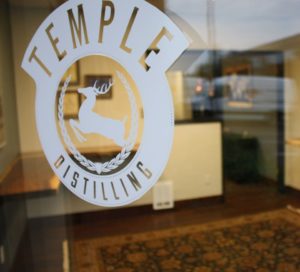
As demand for cleaning and sanitizing products skyrocket amid COVID-19 concerns, a Lynnwood distillery has pivoted from bottling spirits to producing sanitizers.
Since word got out that AJ Temple — owner of Temple Distilling Company — had switched from producing gin to making hand sanitizer, he has struggled to keep up with orders from customers, hospitals and first responders.
“Demand is through the roof and working with the (Washington Distillers Guild) we are scrambling to fill orders all across the state,” he said.
Temple is one of dozens of distillers statewide producing hand sanitizer to aid in the fight against COVID-19. However, he and his wife Jamie were making hand sanitizer before shortages made headlines. When it suddenly became clear that there was a dire need for it, Temple said he felt the need to help.
“I feel like it’s human nature to meet a demand of a community in need, if you are able to meet that demand, so it just made sense,” he said.
Prior to government officials encouraging social distancing, the distillery was planning to launch a new gin series sold by the liter. With those plans on hold, Temple was left sitting on pallets of liter bottles that he will now use to hold sanitizer.
Before being repurposed for cleaning, the alcohol normally used to make gin needs to be denatured, making it unfit for consumption. Temple said he is scrambling to secure denaturing agents like isopropyl alcohol — one of the few things authorized by the Food and Drug Administration, Alcohol and Tobacco Tax and Trade Bureau, and the World Health Organization for sanitizer approved for hospital use. This week, Temple secured five gallons of isopropyl alcohol, which he said would make close to 500 liters of finished sanitizer that he hopes to have ready next week. If that goes over well, Temple said he has about 2,500 more bottles left to fill.
“Worst-case scenario, if we can’t get denaturing agents, we’d look at selling this with the taxes added on, as that is better than nothing,” he said. “I’d rather not be sitting on alcohol that can be saving lives that might cost a little more.”
If the alcohol is not denatured, Temple said it’s subject to spirits taxes, which he said are astronomically high considering the alcohol strength of sanitizer. The distillery is also dumping a 100-gallon batch of gin intended for a product line in Sweden, that will be re-distilled to capture the ethanol, making it fit for sanitizer production.
Besides neutral spirits, Temple’s hand sanitizer also includes vitamin E oil to moisturize and juniper and lemon oil for a “gin-based scent.”
Temple said distribution will depend on the distillery’s supply. At last tally, he said he had close to 2,000 requests from some local and out-of-state organizations for bottles of sanitizer. Once he starts to sell the product, Temple said he will be prioritizing first responders and hospitals, which will receive a discount, and the rest will be sold at market value.
However, regulations around bulk ordering have affected production. When it was first announced that distilleries could produce hand sanitizer, Temple began bulk ordering 2-ounce spray bottles for smaller quantities. Due to new online-ordering guidelines, Temple said he can only order 12 bottles at a time. The smaller bottles have been used to donate hand sanitizer to Ronald McDonald House, nursing homes, the distillery’s delivery drivers, local restaurants and his kids’ daycare.
“We’ve got hospitals and city governments hounding us for some, but they go through sanitizer by the gallon, so we’ll be really excited when we can provide that amount,” he said.
Additionally, the distillery is still taking and delivering orders of gin remaining in stock and offering free delivery within 30 miles of its location at 19231 36th Ave. W. F. Pickups are also available Saturdays by appointment in the tasting room.
Donations to help hand sanitizer production can be made online at the distillery’s web store. Donations can be made in increments of $10, and Temple said funds will go directly to helping procure supplies, offset expedited shipping costs and provide lower costs to private nursing facilities.
–By Cody Sexton








